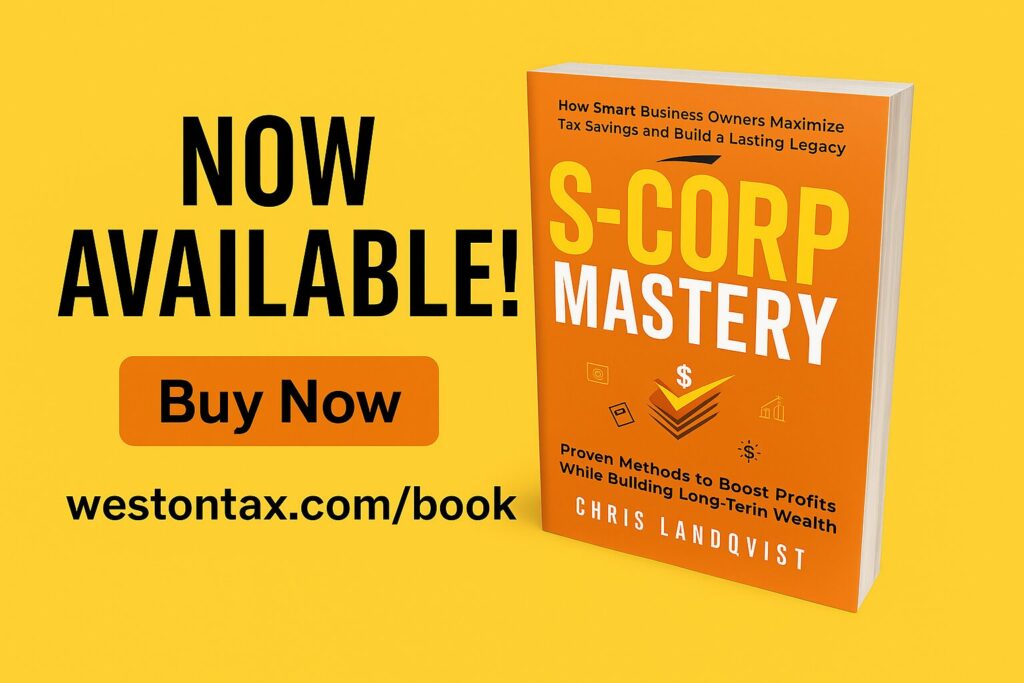Every entrepreneur remembers that first “aha moment” when they realize their business can pay for things their W-2 friends can’t. And one of the biggest eye-openers comes when they learn that even their car — that depreciating hunk of metal in the driveway — can become a strategic, tax-smart asset.
If you’re a business owner, how you buy, use, and record your vehicle can make a five-figure difference in your annual tax bill. The trick is understanding the rules before you start writing checks or signing leases.
Let’s talk about how smart business owners turn vehicles into wealth-building tools instead of just expenses on wheels.
The Myth of the “Free Car”
Let’s get something straight — the IRS isn’t giving away free Teslas. You don’t buy a car for the deduction; you buy a car because your business needs one.
I recently wrote an article about this and you can read it HERE.
But when the car is legitimately used for business, the tax code allows you to recover much of the cost through depreciation, deductions, and reimbursements. That means a well-planned purchase can lower your taxable income this year and, in some cases, for several years ahead.
The key is documentation. Without it, even the best deduction will fall apart under audit. With it, your vehicle becomes a genuine asset that works for your company and your wallet.
Mileage vs. Actual Expense — Which One Wins?
When you use a vehicle for business, the IRS gives you two ways to deduct its costs.
The standard mileage method is simple: for 2025, you can deduct 70 cents per mile for business driving. That covers gas, wear-and-tear, and maintenance. If you drive 10,000 business miles, that’s a $7,000 deduction — clean and easy.
The actual expense method lets you deduct the real costs of operating the car — gas, repairs, insurance, depreciation, and lease payments — multiplied by your business-use percentage.
So if your SUV is used 70 percent for business, you can deduct 70 percent of eligible costs. For owners of higher-priced or heavier vehicles, this method usually wins.
Which one should you choose? The answer depends on how much you drive and what you drive. A strategist can model both methods quickly so you know which saves you the most money before you start logging miles.
Why Vehicle Weight Matters More Than You Think
Here’s where most people’s eyes glaze over — but this part matters. The IRS treats vehicles differently depending on their gross vehicle weight rating (GVWR).
If your vehicle weighs more than 6,000 pounds GVWR, it may qualify for Section 179 or Bonus Depreciation. That means you could write off up to 100 percent of the cost (subject to limits) in the year you place it in service.
That’s why you’ll often see business owners driving large SUVs like a Cadillac Escalade or Chevy Tahoe. They’re not just showing off — they’re optimizing their deductions.
For example, if your business purchases a $90,000 SUV and uses it 80 percent for business, you could potentially write off $72,000 in the first year. That’s real money saved — and the vehicle still belongs to your company.
Smaller sedans can still be depreciated, but the deduction is limited each year under the luxury auto rules. Again, it’s not about the car you love — it’s about the car that fits your business and tax plan.
Should You Lease or Buy?
Leasing and buying both have tax advantages, but they serve different goals. Leasing generally produces smaller, consistent deductions over time — great for cash-flow management and flexibility. Buying, on the other hand, allows for depreciation and potential resale value, which can build equity inside your business.
If you expect to keep the vehicle for more than three years and it qualifies for bonus depreciation, buying is usually the better move. If you prefer to upgrade often or want lower monthly payments without a long-term commitment, leasing can still make sense.
The most important question isn’t “lease or buy” — it’s “how does this choice fit your tax and business strategy?”
When It Makes Sense to Own Personally but Use for Business
Sometimes the best move is not to have the business own the car directly.
If your vehicle use is mostly personal with occasional business trips, you might own it personally and have your company reimburse you through the IRS standard mileage rate.
This approach is simple, clean, and audit-proof if you maintain a mileage log. Your business gets a deduction, you get tax-free reimbursement, and your personal auto insurance stays intact.
This is often ideal for service-based professionals, consultants, or part-time business owners who don’t drive primarily for business but still rack up miles visiting clients or sites.
How to Keep the IRS Happy
The most powerful tax strategy in the world can crumble without documentation. The IRS doesn’t guess — they verify.
If you plan to deduct vehicle expenses, keep a mileage log showing the date, destination, purpose, and miles for every trip. Apps like MileIQ or TripLog make it easy. Keep receipts for fuel, maintenance, and insurance, and note the business purpose for each cost.
A missing mileage log is one of the most common reasons the IRS disallows deductions. The good news is that with the right systems, it takes less than a minute per trip to document — and that minute can save you thousands at tax time.
The Real Story: How One Business Owner Turned His Truck Into a Profit Tool
Meet Carlos, a construction business owner in Florida. He was using his personal pickup truck for work but never tracked his mileage. Each year, he complained about how much tax he owed.
We reviewed his books in September and realized he could buy a new truck, titled to the business, and place it into service before year-end. The truck had a GVWR over 6,000 pounds, qualifying it for bonus depreciation.
By purchasing the $75,000 truck and using it 90 percent for business, Carlos deducted $67,500 immediately — saving nearly $22,000 in taxes.
Here’s the best part: he needed the truck anyway. Instead of losing cash to the IRS, he redirected it into a tool that made him more efficient and profitable.
That’s the difference between spending and strategy.
The Hidden Benefit: Asset Building and Exit Planning
Vehicles don’t have to be short-term tools; they can also play a role in your long-term planning.
If your business owns the car, the asset stays on your balance sheet. Over time, it can be sold, traded, or transitioned as part of a company sale. In certain structures — like S-Corps or multi-member LLCs — assets can even be used to fund owner buyouts or executive benefits down the road.
It’s a small example of a bigger truth: every strategic decision builds layers of financial strength. What starts as a deduction becomes a stepping-stone toward long-term value.
The Fine Print: Common Mistakes to Avoid
Even seasoned entrepreneurs trip up here. The most frequent issues I see is:
- Using a vehicle for both personal and business purposes but claiming 100 percent deduction.
- Forgetting to maintain mileage logs or proof of business use.
- Buying a vehicle but not placing it in service before December 31.
- Failing to title or insure the vehicle correctly for business use.
- Not consulting a strategist before purchase — which can lead to missed depreciation or wrong entity treatment.
The fix is simple: plan ahead, document everything, and coordinate with a professional who knows how the IRS interprets these rules in real life.
Turning the Wheel Toward Smarter Strategy
Your vehicle isn’t just a mode of transportation — it’s a moving opportunity.
Handled properly, it can become one of your business’s most tax-efficient assets. The goal isn’t to chase deductions, but to structure ownership and usage so that every dollar serves both a purpose and a strategy.
That’s the beauty of tax planning: it transforms everyday expenses into long-term advantages.
So before the year ends, take a look at what you drive — and how you own it. You might discover that your next tax break is sitting right in your parking lot.
Welcome to the New Age of Accounting. Let’s begin.
P.S. If you found this article helpful, you’ll love my new book S-Corp Mastery: How Smart Business Owners Maximize Tax Savings & Build a Lasting Legacy. It’s now live and available in a sleek, easy-to-read PDF version. Grab your copy here.

Chris is the Managing Partner at Weston Tax Associates, a best-selling author, and a renowned tax strategist. With over 20 years of expertise in tax and corporate finance, he simplifies complex tax concepts into actionable strategies that drive business growth. Originally from Sweden, he now lives in Florida with his wife and two sons.










